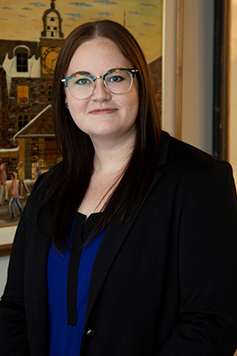Dr. Zanette is an applied developmental psychologist with research interests that lie at the intersections of social, moral, and forensic psychology. Dr. Zanette received her PhD in Developmental Psychology and Education from the University of Toronto and joined Luther College as an Assistant Professor of Psychology in July of 2021. Her research focuses on improving our understanding of childhood deception (i.e., lying and cheating) and applying this knowledge to legal, forensic, clinical, and parenting contexts. Specifically, she investigates two core research questions: (1) how do children learn to deceive and develop patterns of typical and atypical lie-telling; and (2) how can children’s lies be reliably detected in low- and high-stakes contexts? Dr. Zanette’s research has been funded by sources such as the Canadian Institutes of Health Research (CIHR), the Social Sciences and Humanities Research Council (SSHRC), and the American Psychology-Law Society (AP-LS).
Dr. Zanette collaborates with many undergraduate and graduate research students to conduct her research. Students interested in joining Dr. Zanette’s lab as an honours student, graduate student, or research volunteer should contact her directly.
Courses Taught
- PSYC 101 – Introductory Psychology: Social, Developmental, and Clinical Focus
- PSYC 210 – Lifespan Developmental Psychology
- PSYC 415AE – Social-Emotional Development and Applications
Website
Selected Publications
*denotes student contributions
Jackson, R., Ekerim Akbulut, M.*, Zanette, S., Selcuk, B., & Lee, K. (2021). Parenting by lying in Turkey: Experience in childhood and negative outcomes in adulthood. Humanities and Social Sciences Communications, 8:202. https://doi.org/10.1057/s41599-021-00877-9
Zanette, S., Walsh, M., Augimeri, L., & Lee, K. (2020). Differences and similarities in lying frequency, moral judgements, and beliefs about lying among children with and without conduct problems. Journal of Experimental Child Psychology, 192:104768. https://doi.org/10.1016/j.jecp.2019.104768
Bruer, K. C., Zanette, S., Ding, X., Lyon, T.D., & Lee, K. (2020). Identifying liars through the automatic decoding of children’s facial expressions. Child Development, 91(4), e995-e1011. https://doi.org/10.1111/cdev.13336
Santos, R. M., Zanette, S., Kwok, S. M.*, Heyman, G. D., & Lee, K. (2017). Exposure to parenting by lying in childhood: Associations with negative outcomes in adulthood. Frontiers in Psychology, 8:1240. https://doi.org/10.3389/fpsyg.2017.01240
Santos, R. M., Zanette, S., Kwok, S. M.*, Heyman, G. D., & Lee, K. (2017). Corrigendum: Exposure to parenting by lying in childhood: Associations with negative outcomes in adulthood. Frontiers in Psychology, 8:1900. https://doi.org/10.3389/fpsyg.2017.01900
Zanette, S., Gao, X., Brunet, M., & Lee, K. (2016). Automated decoding of facial expressions reveals marked differences in children when telling antisocial versus prosocial lies. Journal of Experimental Child Psychology, 150, 165-179. https://doi.org/10.1016/jecp.2016.05.007
